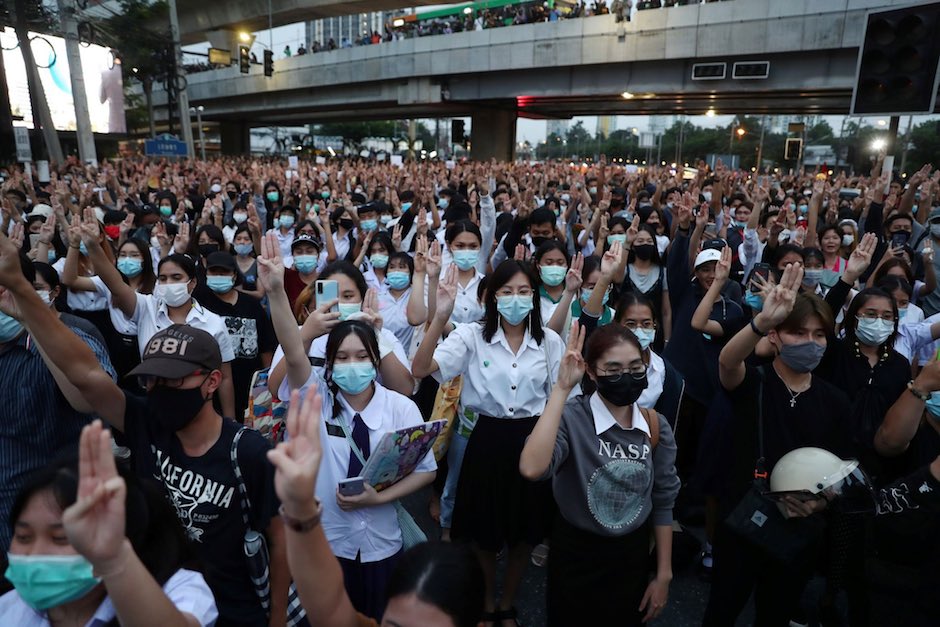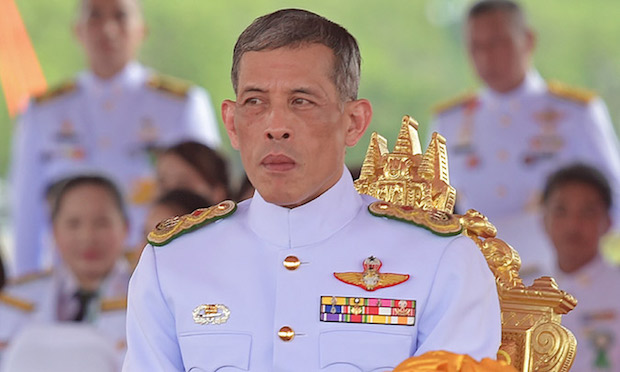Protests show the intergenerational challenge in Thai churches
Thai evangelical leaders “work to keep political issues out of the church”, while young people “feel disappointed that churches ignore what happens in society”.
BANGKOK · 21 JANUARY 2021 · 12:45 CET

The banning of the social Democratic Party Future Forward in February 2020 marked the beginning of historic protests in Thailand that have spread throughout the year.
Although the pandemic limited the demonstrations in the first months, from July onwards thousands of people, especially young people, took to the streets again to express their demands.
The tension has been growing and accumulating progressively since 2014, when army general Prayut Chan-o-cha staged a coup d'état against the interim government of Niwatthamrong Boonsongpaisan. Previously, the Constitutional Court of Thailand had deposed the Prime Minister, Yingluck Shinawatra, for abuse of power.
King Maha Vajiralongkorn, Rama X in the line of succession, who assumed the crown in 2016 after his father's death, has amplifyied his power and influence on the country's elites.
The king, who has been heavily criticised for his disorderly life (he has had four wives) and for his long stays outside the country, has become one of the targets of the protest movement, which is calling for the dissolution of parliament, new elections, and a new constitution by debating a reform of the monarchy.
Different opinions among evangelicals
The protests are organised and led, above all, by young people who “are really active and get involved in the political protest for democracy” Shitthavee Teerakulchon, who works with youth ministries such as IFES and Youth for Christ in Thailand, told Spanish news website Protestante Digital.
“But pastors and senior people are against their actions, so that young people feel disappointed that churches ignore what'd happened in society. There is a huge gap between old and young people right now, even among churches”, he added.
The Evangelical Fellowship of Thailand (EFT), which belongs to the World Evangelical Alliance, has a different opinion of the situation and pointed out that “during the demonstrations in 2020, there was very little involvement among Thai Christian youth”.
“Politics is a sensitive issue around the world and the Thai Christian leadership has worked to keep faith and controversial political issues out of the church”, said the General Secretary of the EFT, Samphan Tangchavalit, and the coordinator of the international department of the entity, Gregg Nicholson.

The challenge of reaching the youth
With an overall average age of 39, according to official data, nearly 30% of the population is under 24, while those over 55 are under 24%. In 2020, the ratio of births (10.7 per thousand people) exceeded that of deaths (8.3 per thousand people).
Thai evangelicals also perceive an imbalance in the impact of the gospel among the different geographical areas of the country. “Young evangelical Christians have decreased a little compared to the past”, Teerakulchon underlined.
“Most evangelism in Thailand is effectively reaching rural and minority people but not people in cities. Each university has a Christian student group with an average of 4-10 people. Although we don't have any religious persecution from the government, theology and churches are not at the service of young people, as Christians we are failing to reach the next generation”.
Evangelism and church planting
According to the EFT representatives, “Thailand celebrates its religious freedom and mutual respect for all religions. Evangelical churches have a great unity of vision and mission to see Thailand reached with the gospel”.
There are almost 6,000 churches in Thailand, which has a population of about 70 million people, but only 0.67% of the population is Christian. Approximately 93% are Buddhists and 6% Muslim.
“There is still a great need to see Thailand reached for the gospel and churches planted. The Thailand Protestant Churches coordinating committee has set a goal to see the number of Christians double by 2025”, Tangchavalit and Nicholson stressed.
The Evangelical Fellowship of Thailand “aims to grow from 2,600 churches to 5,000 churches and to train 5,000 leaders over the next five years”.
Coronavirus: restrictions and new opportunities
The impact of coronavirus in Thailand has not been high, with 12,594 cases and 70 deaths according to the government (as of 19 January 2021), but the authorities have adopted restrictions on mobility and social contact as in other countries.
Churches have also changed their routines, but “although the global pandemic has caused disruption in worshipping together at churches, it has also created opportunities for the churches to serve their communities”, the EFT said.

“It has also forced the church toward a digital transformation to make preaching and training available online. The National Congress on Evangelism was postponed to 2021. However, there are plans for an online pre-congress this April”.
Youth ministries “have cancelled youth conferences, seminars, fellowship groups but we shift to online, which is not really challenging for young people. What really affects us is the financial instability, since the economy is crashing down for everyone”, Teerakulchon explained.
Social and economic impact of the pandemic
The economic impact of the pandemic has not gone unnoticed by the protest movement either. According to Amnesty International, 173 people have been arrested or charged since the movement began.
The Thai Lawyers for Human Rights organisation said police officers have even questioned children in schools, and the Bangkok Criminal Court recently sentenced a former official to 43 years in prison after she shared a recording criticising the monarchy on social media between 2014 and 2015.
“In the last decade, it was not that challenging for newly graduates to find a job and prosper. But this year, the coronavirus resets the game and young people will surely face the issue of unemployment”, Teerakulchon warned.
The churches try to combine their social action ministries with the care of their own communities, some of which are in a fragile situation.
“In 2020 churches prepared and distributed thousands of meals to those in need because of Covid lay-offs and shutdowns. The pandemic also affected local pastors of small churches in the villages, so that a fund was created to financially help those pastors”, the EFT recalled.
Meanwhile, young people “have visited rural areas, serving marginalized people. Thai Christian youth is pretty engaged with the society”, Teerakulchon pointed out.
Pray for Thailand
The EFT leaders called on Christians worldwide to “pray for the evangelical church to continue to work together to see the Great Commission accomplished in the nation”, while Teerakulchon asked to pray for “the conflict among young and old people about their political differences”.
Both agree on the importance to pray for “the financial crisis that many are facing” and “that God would use the pandemic to draw people to Himself as the church seeks to serve those in need”.
Published in: Evangelical Focus - world - Protests show the intergenerational challenge in Thai churches
